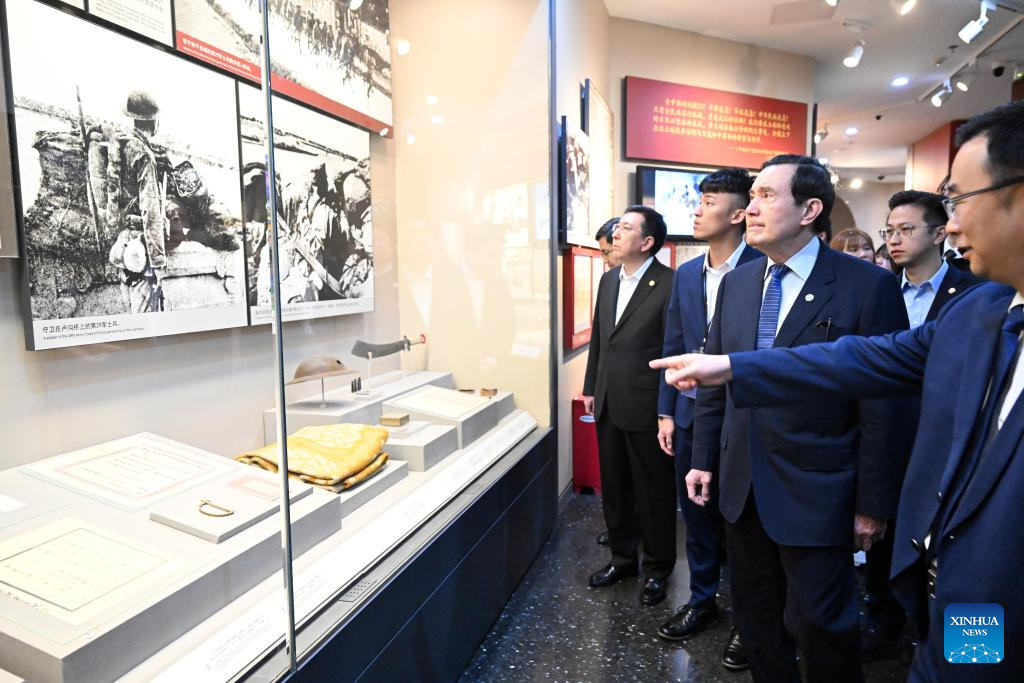
Ma Ying-jeou, former chairman of the Chinese Kuomintang party, said on Monday that any so-called de-Sinicization efforts would not succeed, as Chinese culture is "deeply rooted in the blood of the descendants of Emperor Yandi and Emperor Huangdi".
He made the remarks after visiting the Palace Museum in Beijing, together with a delegation of Taiwan youths, on his first day in Beijing during his mainland visit.
Ma and the youth delegation toured the Taihe Dian, or Hall of Supreme Harmony, the Nine-Dragons Wall, and visited the restoration studio for cultural relics.
"Today, I brought young students from Taiwan to the Palace Museum, and I couldn't hide my excitement," he said in a group interview after the tour.
"The Palace Museum, which has endured 600 years of ups and downs, has always symbolized the Chinese nation. We can feel the depth of Chinese culture and the essence of each dynasty," said Ma.
He said that the cultural relics of the Palace Museum in Taipei came from the Palace Museum in Beijing, noting that the cultural relics featuring Chinese culture of more than 5,000 years moved south during the wars of the past, leaving "a legacy of history".
Ma said that he had facilitated mutual visits between the Palace Museums in both Beijing and Taipei, with several joint exhibitions already held.
The former KMT leader emphasized that the exchange and cooperation between the two Palace Museums are excellent examples of interaction across the Taiwan Strait.
He highlighted that more cultural exchanges between the two sides, including in drama, dance and music, are a "common language that cannot be severed by any deliberate efforts or ideology".
"I also deeply believe that any so-called de-Sinicization efforts will not succeed because Chinese culture, with its long history, is deeply rooted in the blood of the descendants of Emperor Yandi and Emperor Huangdi."
"Only by returning to our national sentiments and Chinese culture can cross-Strait relations last long," Ma stressed.
On Monday morning, Ma and the Taiwan youths also visited the Museum of the War of the Chinese People's Resistance Against Japanese Aggression near the Lugou Bridge and engaged in a conversation with Zheng Fulai, a 93-year-old witness of the Lugou Bridge Incident in 1937.
Lugou Bridge is where Japanese forces used a pretext to launch an attack. The incident is recognized as the start of Japan's full-scale invasion and China's full-nation resistance against the invaders.
Zheng, who has spent years voluntarily explaining the history of the war to visitors on the bridge, said: "Remembering history is not to perpetuate hatred, but to be confident!"
"Our country is gradually becoming stronger. We do not bully others, nor do we take advantage of them," said the elderly man.
He stressed that history is the best textbook and a mirror, urging Ma and the visiting youths to tell their compatriots in Taiwan to "come back home and have a look".
"We, the younger generation, must remember not to repeat the mistakes of history," Ma said.
"As descendants of Emperor Yandi and Emperor Huangdi, we must learn to resolve disputes peacefully, seek happiness and peace for humanity.
"I hope our young people will firmly remember this," he added.


